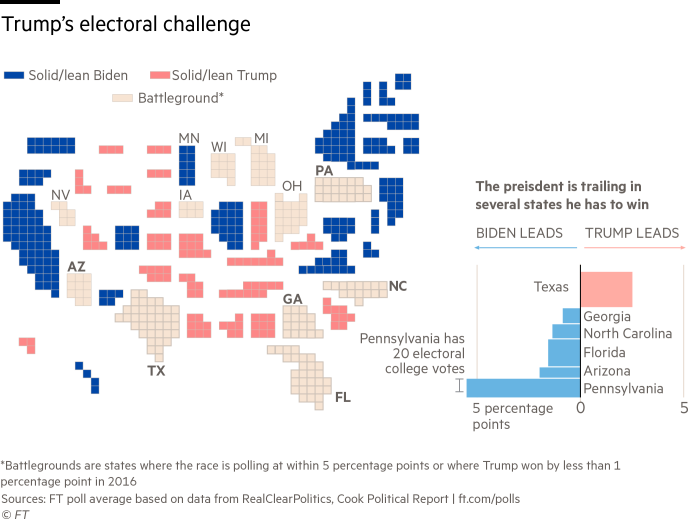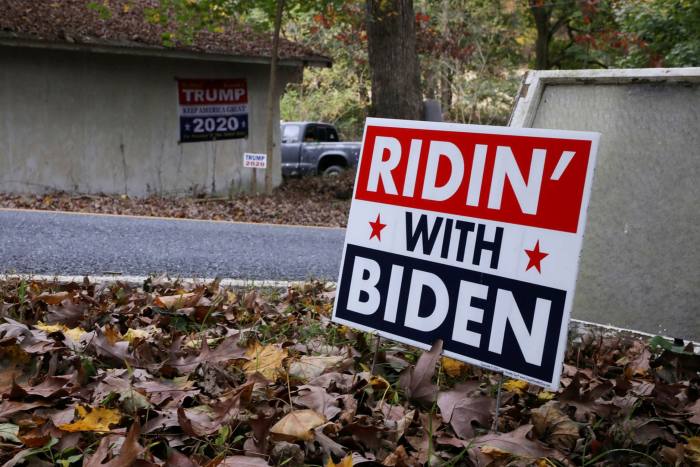Trailing in the national polls, Donald Trump spent the final week of the US presidential campaign on a frenetic sprint across the country — a last-ditch burst of rallies that seemed impossible just a month ago when he was in hospital with Covid-19.
In a desperate attempt to shift the momentum of the race, the president campaigned twice in both Michigan and Wisconsin, two states in the upper Midwest that he won in 2016 despite the polls predicting he would lose. Mr Trump has also visited a string of southern states that he must almost certainly hold on to if he is to stand any chance of defeating Joe Biden in Tuesday’s election — Arizona, Florida, Georgia, North Carolina and Texas.
But the president has been spending the most time in the state that more than any other holds the key to victory in this election — Pennsylvania.
“At every turn, Biden twisted the knife into the back of Pennsylvania workers,” Mr Trump said in Montoursville on Saturday, in his ninth rally in the state since recovering from Covid-19. “They keep saying its close [in Pennsylvania] but I don’t think its close.”
On Monday, he will campaign in Scranton, the Pennsylvania birthplace of Mr Biden. His Democratic rival and Kamala Harris, Mr Biden’s running mate, will spend the day fanning across the state in a final pitch to voters.

On the eve of the election, Mr Biden has a 8.6-point national lead in polls, according to FiveThirtyEight, the poll tracking website. He also leads every swing state except Iowa and Ohio. In a sign of the headwinds facing Mr Trump, his rival leads in Georgia, which has not voted for a Democrat in almost 30 years, and the two men are neck and neck in Texas, which has not backed a Democrat since Jimmy Carter won in 1976.
Pennsylvania, with its 20 electoral college votes, is central to the electoral map for both campaigns. It is as close as there is to a must-win state for the president. Mr Trump could mathematically get the 270 he needs to win without Pennsylvania, but a loss would dramatically cut his re-election chances.
“Pennsylvania is the one critical state for both candidates,” says Brendan Boyle, a Philadelphia Democratic congressman. “You can come up with a map for Biden to reach 270 without Florida, but not without Pennsylvania. You can come up with a map for Trump without Wisconsin and its 10 votes, but you cannot come up with a winning map without Pennsylvania.”
It is crucial for other reasons, too. Although Mr Trump lags in several of the southern swing states, he is within the polling margin of error — which means that a Trump win would not be a huge surprise. But in Pennsylvania he trails Mr Biden by an average of 4.8 points, according to FiveThirtyEight. To pull off a victory, he will need to confound the pollsters — just as he did in 2016.
It is also one of the states most likely to see a fierce legal battle over election procedures and vote-counting if the result turns out to be close.

The Supreme Court last week refused to hear a Republican petition to block the state from accepting absentee ballots that arrive within three days of the election, but did not rule out revisiting the issue. The situation could become fraught if the outcome is very close and Mr Trump repeats his previous baseless assertions that the process is tainted by fraud.
Neither party is taking anything for granted. “It is probably accurate that the race is tightening,” says Chrissy Houlahan, a Democratic congresswoman who represents south-east Pennsylvania. “In terms of the energy on the ground, it’s feverish.”
The fight over the ‘Trump Democrats’
Until Mr Trump won it four years ago, Pennsylvania had voted Democrat in every election since 1992. The state contains several of the key dynamics that will define this election. It has large numbers of white, working-class voters, many of them in more rural areas — a demographic that has proved susceptible to the Trump message. But it also has a big constituency of college-educated, suburban women who once might have voted Republican but are now moving away from the party.
In winning Pennsylvania, and other states such as Michigan and Wisconsin that had not voted Republican in three decades, Mr Trump broke through what the Democrats had dubbed their “blue wall”. His Republican support was critically bolstered by white, working-class voters in the rust-belt and Midwestern states who became known as “Trump Democrats” after they abandoned their party to vote for the reality TV star. He improved on the Republican result in 2012 in almost all of the 67 counties in Pennsylvania.

“There’s no question that in 2016 Hillary Clinton lost because in so many blue-collar communities there was a drop in the Democratic vote,” says Mr Boyle. “Everywhere from north-east Philadelphia to hundreds of miles away in Erie [county].”
With the president polling worse with women than four years ago, he may now be even more reliant on Trump Democrats. But Mr Biden is seen as a stronger candidate in the rustbelt states than Mrs Clinton was in 2016. Ed Rendell, a former Pennsylvania Democratic governor, says Mr Biden is well placed to win back those votes.
“Biden is clearly more their type of guy than Trump,” he says. “He was born poor, his father was a union guy.”
Jobs message
One test will be in Erie County, north-western Pennsylvania. Nestled between Ohio and New York along Lake Erie on the border with Canada, it backed Mr Trump in 2016, the first Republican win there since Ronald Reagan in 1984. It was one of three counties in the state — and 206 in the US — that voted for Barack Obama in 2008 and again in 2012 but then swung to Mr Trump four years later, according to Ballotpedia.
When Mr Trump campaigned in Erie two weeks ago, it was a clear sign that he was worried about shoring up his support in Pennsylvania. As the pandemic has ravaged the economy and Mr Trump has come under heavy criticism over his handling of the crisis, he has been forced to play defence in places like Erie that he once hoped would be much easier targets.
“Before the plague . . . I had it made. I wasn’t coming to Erie,” Mr Trump said. “We had the greatest economy . . . then we got hit with the plague and I had to go back to work. Hello Erie, may I please have your vote?”

Jim Wertz, the top Democratic official in the county, says local Democrats felt ignored in 2016. “Clinton was the first Democratic presidential candidate not to come here for a long time. People responded poorly to that,” he says, adding that blue-collar Democrats had been leaving the party even before the rise of Mr Trump.
“It was cultural and economic. For the folks that felt the economic squeeze, they blamed both parties, who told them the same thing year after year. But some of the blue-collar voters shifted to the Republican party because over time it has leaned more into cultural issues. There was a lot of buy-in . . . on the ‘God and guns’ narrative.”
Anjali Sahay, a politics professor at Gannon University in Erie, says the county has lost 16,000 jobs since 1990. “I don’t think it was a sudden swing to Trump in one election but a constant feeling that jobs were being lost,” she says.
Some experts say the Democrats failed to focus enough on economic issues as manufacturing jobs in western Pennsylvania evaporated. To appeal to Trump Democrats, Mr Biden is proposing a “Made in America” plan that would penalise US companies that produce goods overseas.
“Whoever gets the jobs message across is probably going to be the winner here,” says Ms Sahay.
One Erie man who gambled on Mr Trump but now has buyer’s remorse is Rodney Chiarelli, vice-president of American Tinning and Galvanizing Company, a metal finishing company in Erie.
“A lot of people had the same feeling that they didn’t like Hillary so we’ll give this guy with his pretty funny campaign [a chance],” says Mr Chiarelli, who believes some of those Trump Democrats will help Mr Biden win Erie after seeing the president in a different, less flattering, light. “I don’t like a cheater and that’s what he is.”
Trump masks in Pittsburgh
Other parts of western Pennsylvania may be tougher for Mr Biden. Kristen Coopie, a politics expert at Duquesne University in Pittsburgh, says the areas surrounding Allegheny county, a liberal area that includes Pittsburgh, remain very conservative.
“The Trump support is really amazing when I drive around,” Ms Coopie says. “Trump signs are everywhere.”

She believes few Trump supporters would consider switching to Mr Biden even though the president has not delivered on all his pledges — such as bringing back coal jobs. “Even if they’re not feeling better off economically, they’re not going to jump ship. If you’re an American football fan, you’re not going to leave the Pittsburgh Steelers and become a Cleveland Browns fan.”
Laura Schisler, a Republican from suburban Pittsburgh, says Republican support for Mr Trump has soared since his first victory. “The energy now is absolutely incredible. Back then, everybody was afraid to say if they supported him. They were more in the closet. Now you’ve got people wearing big old Trump masks.”
There are other signs pointing to a tough climb for Mr Biden outside the cities and suburbs. Washington county, just south-east of Pittsburgh, recently saw Republicans surpass Democrats in voter registration. Guy Reschenthaler, a Republican member of congress whose district includes the county, says new voters are registering with the GOP.

Mr Reschenthaler says people are not opting for Mr Trump because they are anti-Biden, but because they feel that the Democrats have ignored them or treated them as “rubes”, or uneducated voters. One example, he says, was when Mr Obama in 2008 said Pennsylvanians would “cling to guns or religion” because nothing had replaced the disappearing jobs.
“People hunt and engage in sport, clay and trap shooting. It’s just part of the culture here. And of course religion is still very prevalent here. So those kinds of remarks just alienate voters in south-western Pennsylvania,” he adds.
His constituents worry that Mr Biden would ban fracking, a key part of the local economy, despite denials from the former vice-president. He believes the polls are underestimating support for Mr Trump — just as in 2016, when pollsters did not give enough weight to blue-collar men without college degrees — and as a result missed the shift in swing states in the Midwest.

Most pollsters say they have revamped their models to correct for that bias, but some Republicans are not convinced that they are capturing the enthusiasm for Mr Trump.
“It’s very difficult to get men who are 45 and under on the phone, and when they get on the phone and figure out it’s a pollster they hang up or . . . prank them,” says Mr Reschenthaler.
In a boost to Mr Trump, the Pittsburgh Post-Gazette endorsed him on Sunday, the first time the paper has endorsed a Republican since 1972. It said that while Mr Trump had many faults, including his handling of the pandemic, he would be better for the local economy.
Engaging the ‘soccer moms’
While Mr Trump may have the edge with working-class men in the western and central parts of the state, Ms Houlahan says Mr Biden has a big advantage with women in urban and suburban areas.
In recent weeks, the president has dispatched his wife, his two daughters and former South Carolina governor Nikki Haley to Pennsylvania to woo Republican women.
“Having the female surrogate out there is especially important. It’s the sisterhood argument. He realises he has a problem with suburban women,” says Ms Coopie.
Swamp notes

In the countdown to the 2020 election, stay on top of the big campaign issues with our newsletter on US power and politics with columnists Rana Foroohar and Edward Luce. Sign up here
At a campaign rally in the city of Johnson in September, Mr Trump urged Republican women to return to his side: “Suburban women, will you please like me?” He argued that the suburbs were at risk from anti-racism protests sparked by the killing of black Americans by police officers.
More recently Mr Trump had eased off from the argument as it gained little traction, but he returned to the theme in Pennsylvania over the weekend.
Mr Reschenthaler thinks it may resonate after protests last week followed the fatal police shooting of a black man, Walter Wallace Jr, in Philadelphia, including serious looting. “The chaos you’re seeing in Philadelphia over the past few days is bringing suburban women back to the party,” he says.
But Ms Houlahan, the first Democrat to represent Chester county which includes some Philadelphia suburbs, in more than 160 years, thinks women have had enough of Mr Trump because of his style and handling of Covid-19.
“In the Philadelphia suburbs, those ‘soccer moms’ that you always hear about . . . have become energised over the past four years as a consequence of Trump’s election,” she says. “They are more politically engaged.”
Follow Demetri Sevastopulo on Twitter

